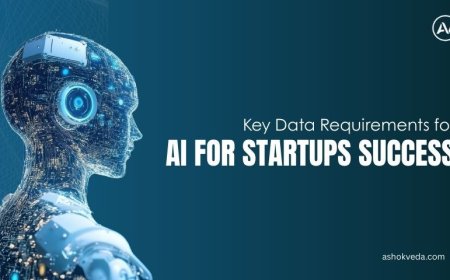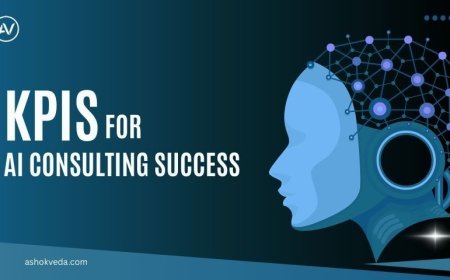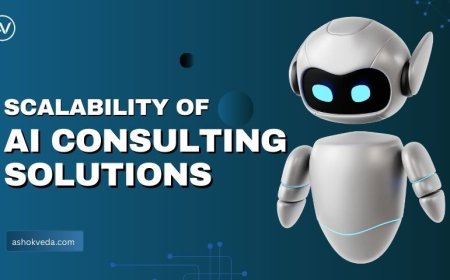What is AI Consulting Mean for the Future of Business
What AI consulting means for the future of business, and how it empowers companies to innovate, automate, and make smarter data-driven decisions.
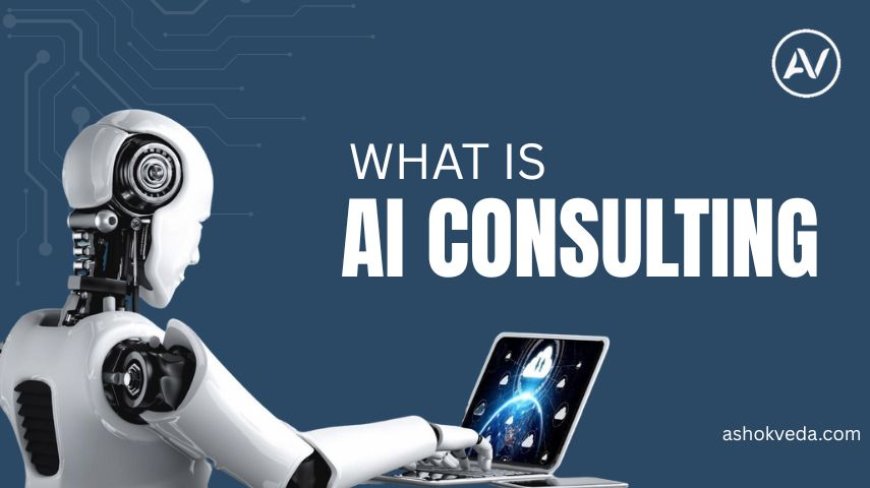
Artificial Intelligence (AI) it's a defining technology of the decade. Organizations across every industry are racing to harness AI’s transformative potential for automation, customer insights, product innovation, and decision-making. This surge is evidenced by staggering market growth: the global AI consulting market, valued at $11.07 billion in 2025, is projected to soar to $90.99 billion by 2035, growing at a robust 26.2% compound annual rate. In the US alone, the market value for corporate AI consulting stands at $37.8 billion, with over half of large enterprises already leveraging these services.
Such numbers are more than statistics; they underscore a fundamental shift in how businesses compete. AI is fast becoming a necessity, not a luxury, with 84% of business leaders reporting improved forecasting accuracy thanks to AI, and 75% of top executives viewing it as critical for their organization's long-term competitiveness. Yet, with tremendous promise comes complexity. That’s where AI consultants step in—translating AI’s technical intricacies into actionable business value.
What is an AI Consultant?
An AI consultant is a professional who specializes in guiding businesses through the adoption and implementation of AI technologies. They bridge the gap between advanced AI tools and tangible business outcomes, combining deep technical expertise with keen business strategy. AI consultants understand both the nuts and bolts of machine learning, natural language processing, and automation, as well as the market dynamics and operational needs of their clients.
Think of an AI consultant as both architect and navigator. They demystify AI, help organizations identify worthwhile applications, and drive projects from vision through delivery, ensuring lasting value is realized, not just technical novelty.
Why Do Companies Need AI Consultants?
The growing demand for AI consultants is rooted in several compelling business realities:
-
Rising Complexity: AI solutions can be intricate to design, build, and deploy. Most organizations lack the specialized skills and experience to go it alone.
-
Strategic Alignment: Without expertise, AI risks becoming a costly science experiment rather than an engine for business growth. Consultants ensure AI initiatives align with core objectives and drive measurable improvements.
-
Resource Constraints: Especially among small businesses, in-house talent for AI is scarce. Consultants provide the necessary know-how and accelerate time-to-value.
-
Change Management: AI implementation often requires significant workflow changes and upskilling. Consultants guide organizations through organizational and technological transformation.
-
Ethics and Compliance: As AI raises new legal and ethical challenges, consultants help companies adopt solutions responsibly and navigate evolving regulations.
In essence, AI consultants turn AI adoption from a risky gamble into a disciplined, value-driven journey that empowers innovation while managing cost and risk.
Key Roles of an AI Consultant
AI consultants wear many hats to ensure organizations thrive in the age of intelligent automation. Their primary roles include:
-
Business Analyst: Understanding current operations, pain points, and strategic needs by engaging deeply with stakeholders.
-
Opportunity Finder: Identifying the highest-value use cases for AI within an enterprise, whether it’s automating customer support, predicting supply chain disruptions, or personalizing marketing campaigns.
-
Strategist: Designing robust AI roadmaps that outline the “what,” “why,” and “how” behind AI projects—including which technologies to use, anticipated ROI, and timelines.
-
Technical Lead: Overseeing the selection, customization, and integration of AI models, algorithms, and platforms relevant to the client’s problems.
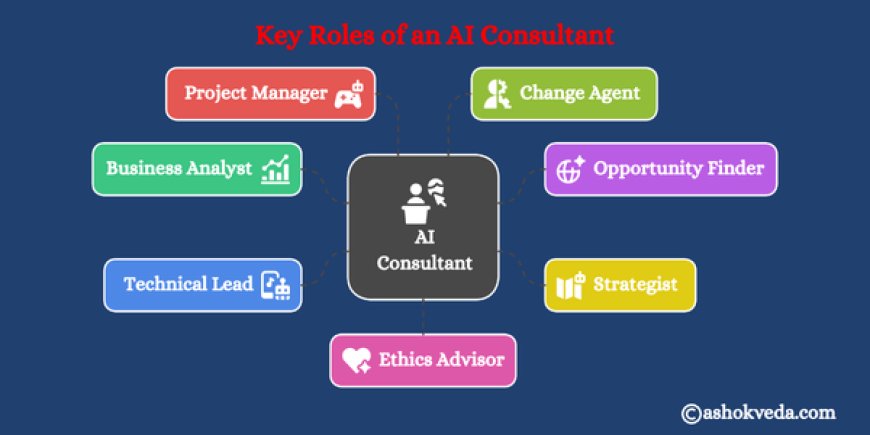
-
Project Manager: Supervising the end-to-end lifecycle of AI projects—from initial scoping and vendor selection to deployment and ongoing optimization.
-
Change Agent: Managing the adoption process, training staff, and updating company culture to embrace AI-driven ways of working.
-
Ethics Advisor: Ensuring responsible and transparent use of AI, balancing innovation with fairness, privacy, and regulatory compliance.
Responsibilities of AI Consultants: Small Business vs. Enterprise
While core responsibilities remain similar, the context shapes how consultants operate in small businesses versus large enterprises.
For Small Businesses
-
Needs Assessment: Evaluate where AI can deliver maximum impact within resource limitations.
-
Solution Selection: Recommending cost-effective, scalable AI tools suitable for SMBs, often opting for cloud-based or SaaS solutions.
-
Implementation Roadmap: Develop phased plans that deliver quick wins, minimize risk, and align with cash flow realities.
-
Training & Support: Provide practical training for non-technical employees, empowering them to use AI applications with confidence.
-
Adoption Management: Guide change management, ensuring minimal disruption and fostering a culture open to digital transformation.
-
Continuous Optimization: Offer ongoing monitoring and improvement to fine-tune models as the business (and its data) matures.
For Enterprises
-
Strategic Alignment: Craft large-scale AI strategies linked to cross-departmental objectives and long-term innovation plans.
-
Data Architecture: Design sophisticated data infrastructures and manage extensive, often siloed, data assets.
-
Custom Development: Oversee the creation of bespoke AI solutions integrated tightly with complex legacy systems and diverse platforms.
-
Stakeholder Management: Coordinate efforts across numerous stakeholders—IT, business units, compliance, and executive leadership.
-
Security & Governance: Implement advanced security protocols, maintain data privacy, and ensure compliance with global regulations.
-
Advanced Analytics: Drive initiatives in predictive maintenance, fraud detection, demand forecasting, and more, often at massive scale.
Everyday Activities of an AI Consultant
A day in the life of an AI consultant can be dynamic and highly varied. Common activities include:
-
Meeting with Stakeholders: Clarifying goals, updating on progress, and aligning AI efforts to shifting business needs.
-
Conducting Data Assessments: Gathering, cleaning, and exploring datasets to identify feasibility and readiness for AI.
-
Mapping AI Use Cases: Analyzing business processes to pinpoint where automation, prediction, or personalized insights can add value.
-
Developing Prototypes: Working hands-on with data scientists to build and test pilot models or proof-of-concept solutions.
-
Vendor Evaluation: Reviewing third-party AI platforms, tools, and tech stacks for fit and future growth.
-
Documentation & Training: Preparing reports, technical guides, and training materials for executive and operational teams.
-
Monitoring Solutions: Overseeing the performance and reliability of deployed AI models, troubleshooting issues, and optimizing for better outcomes.
-
Ethics & Compliance Review: Regularly evaluating AI use for transparency, fairness, and adherence to best practices.
The Most Essential Skills for AI Consultants
Successful AI consultants stand out not just for their technological know-how but for a rare blend of technical, business, and interpersonal skills:
|
Skill Category |
Essential Areas |
|
Technical Expertise |
Machine learning, deep learning, natural language processing, data analytics, programming (Python, R, SQL), AI platforms (TensorFlow, PyTorch) |
|
Business Acumen |
Strategic thinking, industry awareness, linking AI solutions to measurable business value, and ROI analysis |
|
Communication |
Ability to explain complex AI concepts clearly to non-technical stakeholders, persuasive presentation, and negotiation |
|
Problem Solving |
Innovative and analytical mindset for identifying and addressing novel challenges |
|
Project Management |
Planning, organizing, and overseeing multi-phase projects and diverse teams |
|
Change Management |
Guiding organizations through the human side of digital transformation |
|
Ethics & Compliance |
Awareness of ethical/legislative AI issues (bias, privacy, fairness), and ability to advise accordingly |
To thrive, AI consultants must be lifelong learners—constantly updating their skills as the technology, market, and regulatory landscape evolve.
AI consulting is not just a growing industry; it’s an essential catalyst for business transformation worldwide. As global competition intensifies and artificial intelligence reshapes entire markets, the demand for experienced AI consultants—who can bridge the worlds of technology and strategic business execution—is destined to grow even further. For businesses, partnering with the right AI consultant means more than implementing tools; it means unlocking new opportunities, achieving measurable performance improvements, and securing a competitive edge in the age of intelligent automation. Whether you’re a nimble startup or a global enterprise, leveraging expert guidance is crucial to harnessing AI’s power and avoiding its pitfalls.

























